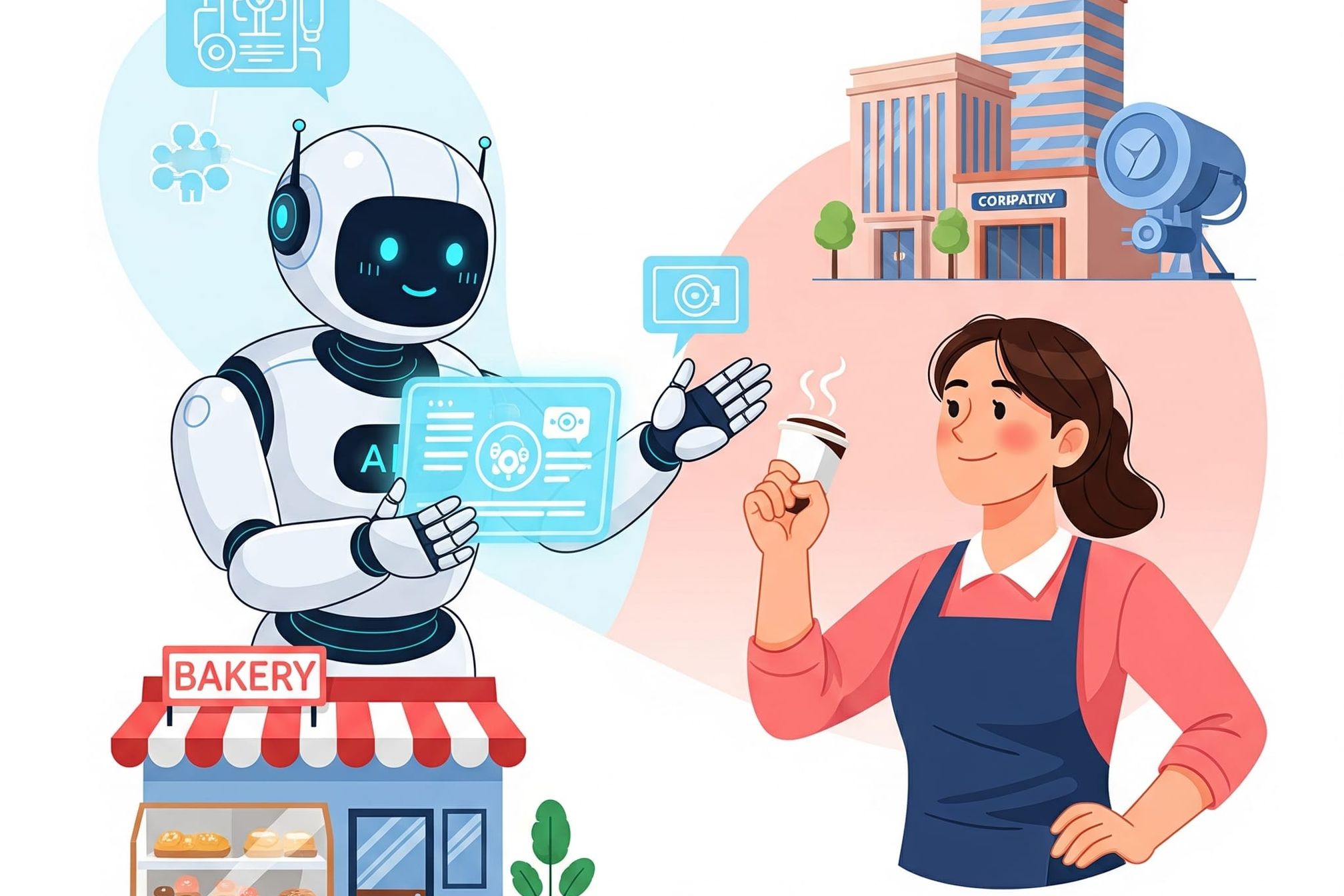Thursday, June 26, 2025
AI Isn’t Just for Big Business: Why Local Companies Are Adopting Smart Automation


On a sunny Saturday morning, two storefronts sit side-by-side on Main Street. One is a beloved neighborhood bike shop, the other a national chain that opened last month. At 8:05 a.m. a customer calls each store with the same question: “Do you have a 54-centimeter gravel bike in stock?”
- The national chain’s AI-powered phone assistant answers instantly, confirms inventory from the POS, and offers to hold the bike.
- The local shop’s phone rings five times, then dumps the caller into voicemail.
Guess which business landed the sale.
For years, artificial intelligence felt like a “Fortune-500 problem”—expensive, complicated, and out of reach for small businesses. That story is officially over. Recent surveys show that more than three-quarters of U.S. small businesses are already using or actively exploring AI to drive everything from customer service to marketing automation (nsbaadvocate.org). Another 36 % are using generative AI tools right now, with 21 % planning to adopt within 12 months (axios.com).
If you’re still waiting on the sidelines, every day costs you credibility, customers, and cash. This guide busts the “AI is only for big business” myth, showcases real-world wins, and gives you a practical roadmap to get started—no white-coat data scientists required.
1. The Myth: “AI Is Only for Fortune 500s”
The origin story sounds familiar: early AI experiments required seven-figure budgets and specialized PhDs. But cloud platforms and no-code interfaces have shredded those barriers.
- Adoption is mainstream: 76 % of small businesses are already experimenting with AI or plan to within a year (nsbaadvocate.org).
- Budget isn’t the blocker: A ServiceDirect study found 77 % of SMBs have adopted AI “in some capacity,” often through tools costing less than a single utility bill (servicedirect.com).
- Competitive urgency: PayPal’s 2025 SMB Tech Survey reports that over 50 % of small businesses see AI as a “must-have” edge—not a “nice-to-have” (newsroom.paypal-corp.com).
Reality check: The longer you delay, the farther behind you fall—not just on efficiency, but on customer expectations molded by AI-enhanced giants.
2. How AI Levels the Local Playing Field
2.1 24/7 Customer Service Without Payroll Bloat
AI receptionists and chatbots pick up in under a second, resolve FAQs, book appointments, and escalate edge cases to humans. They never ask for overtime, coffee breaks, or vacation days. That lets a five-person plumbing company provide the same always-on responsiveness as a state-wide franchise.
2.2 Smarter Local Marketing With AI-Driven Targeting
Ad platforms like Google and Meta now expose API hooks that let AI optimize bids in real time, turning a $50 daily budget into enterprise-grade targeting. Instead of guessing keywords, an AI engine analyzes call transcripts, customer reviews, and competitor ads, then reallocates spend toward the highest-converting demographics—automatically.
2.3 Operational Efficiency: Automating Repetitive Admin Tasks
Invoice reminders, appointment confirmations, follow-up surveys, even parts-reorder triggers—AI bots handle them behind the scenes. Result: your office manager focuses on high-touch tasks (upsells, community events) instead of copy-pasting emails.
2.4 Instant Data Insights Without a Data Team
AI analytics dashboards translate raw POS or CRM figures into plain-language insights: “Tuesday happy-hour specials drive 34 % higher average ticket—consider extending to Wednesday.” No pivot tables required.
2.5 Personalized Upsells at Scale
By tapping your CRM, an AI assistant can greet a returning caller: “Hi Sam, I see we replaced your AC unit in 2023. Would you like to schedule your annual maintenance tune-up?” Personal touches like these lift average order value by double digits—without asking frontline staff to memorize every customer file.
3. Dollars and Sense: What AI Really Costs in 2025
You don’t need a CFO to spot the delta:
Hiring a full-time receptionist at $20/hour plus payroll taxes runs $4,000–$5,500 per month for 160 staffed hours. An AI assistant covering 720 hours (the entire month) averages $300. Even if you kept your human front desk for in-person guests and layered AI on phones and SMS, the blended cost is still a fraction of adding another employee.
4. Choosing the Right AI Stack for Your Local Business
Step 1: Define the biggest pain. Is it missed calls, marketing waste, or back-office busywork?
Step 2: Match tool to outcome.
- Phones & Front Desk → AI receptionist/chatbot.
- Marketing → AI campaign optimizer (integrates with Google & Meta).
- Ops/Admin → Workflow automation platforms like Zapier + GPT connectors.
- Analytics → Natural-language BI dashboards (e.g., ChatGPT plugins, Microsoft Copilot).
Step 3: Vet integrations. A great AI that doesn’t talk to your CRM becomes data silo #57. Make sure API or Zapier hooks exist.
Step 4: Pilot fast, measure, iterate. Most cloud AI tools go live in hours. Set a 30-day KPI (e.g., answer rate, cost per lead) and let data drive your next step.
Frequently Asked Questions
Will AI replace my staff?
AI takes over repetitive, rules-based tasks, freeing humans for high-touch work like complex sales consults or on-site service. Think “Iron Man suit,” not “replacement robot.”
How long does AI take to set up?
Modern solutions integrate via web dashboard and API keys. LeadAxle can set your team up with an AI assistant can be live in a business day with call-forwarding, basic scripts, and CRM sync.
Conclusion
AI is no longer the secret weapon of mega-brands; it’s the new cost of doing business—just like having a website was 15 years ago. The data is clear: 38 % of SMBs already leverage AI, and the percentage climbs every quarter (lifewire.com). Each month you delay means more missed calls, slower service, and higher costs compared to AI-enabled competitors down the street.
Ready to close the gap?
Book a 30-minute discovery call to hear LeadAxle’s AI assistant handle real customer scenarios.
You don’t need to be big to think big—just smart enough not to wait.
Disclaimer: This article is for informational purposes only and does not constitute financial or legal advice. Always consult qualified professionals regarding your specific circumstances.